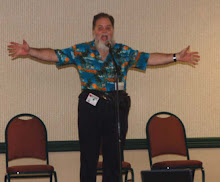By Trudy V. Myers; editor and publisher of Ship To Shore
Somebody suggested that OSFES hold a 'fanzine workshop' at OSFest 4.0. Remembering the hours and hours of typing and layout I used to do, back when I did fanzines, my first reaction was, "No way! Can't be done!"
Since then, the back burner of my mind has been mulling it over and … maybe it could.
Very early fanzines were just a collection of content – letters, stories, whatever – slapped together, mimeographed and disbursed. There was little or no editing done on the contents. There may not have been a coherent page-numbering system or a cover or even a method of holding the pages together.
Certainly, something like that could be done. Would doing it serve any purpose? Because if you're going to offer this as a workshop, there should be some purpose, something people will learn from participating.
I see 3 groups who might be interested in how such a workshop did; the writers who might have their stuff in the 'zine, the workshoppers who want to learn how to do a 'zine, and readers who might be interested in the final product. And if done right, a workshop could benefit all three groups. The writers might get a clue how their writing is doing; the workshoppers might get a glimpse into the life of an editor/publisher, and the readers might actually have something decent to read.
Plans are extremely nebulous right now, but these are my rough thoughts on how such a workshop might work:
- People who want to submit their work for consideration for the OSFest 4.0 fanzine would have to send them in early. I'm thinking we should keep the size of these stories short, maybe 2,000 words each, because I don't want the workshoppers to miss everything else happening at the convention as they try to slop their way through 100,000 words of stories in 24 hours!
- People planning to attend OSFest 4.0 who want to participate in the fanzine workshop would need to check in with The Publisher on Friday to get their assignment. They would be handed their share of the stories in the 'slush pile' to read and decide what was 'good enough' to be considered. They would be given a few basic instructions, such as "If a story hasn't caught your attention by the end of the first page, stop reading; you don't have time."
- In Phase 2 of the workshop, either Saturday night or Sunday morning, the workshoppers would meet again to make their final decision. Stories that did not 'make the grade' would be packaged up for the return home, perhaps with a few comments by the 'workshop participant' to the author. The others would be put together, pages numbered, a Table of Contents page added, and maybe a 'cover'. Then it would get shipped off to a copy shop for reproduction.
- Would the workshoppers need to gather together one more time to correlate the pages and bind them in some way? Or would we ask the copy shop to do that?
- At – or slightly before – closing ceremonies, the finished product would be available for sale at a price that would cover the printing costs.
I haven't worked out where the money comes from to get the printing done. And now that I've put some thoughts down on paper, I can see places where things could be done differently.
Any thoughts? Any interest? Speak now or I'll tell Programming to put this idea back on the shelf.

Sounds interesting and might be fun. The submissions should be in electronic format so that we can cut/paste/edit?? without retyping. You might also want to have another session (Friday evening?) to discuss things like layout, printing, and the like so they will have a better idea how to do that themselves on their own later. This would also be the time to come up with some design/layout decisions for the workshop project (name, format, etc)
ReplyDeleteYes, definitely have the copy shop do the collation and stapling. ConQuesT has been having the copy shop do that for our pocket program for the last couple yrs.
When I was doing KaCSFFS newsletter, I'd put that together in a weekend. Although I had a prebuilt template I made and it was a lot smaller (12-16 halfsize pgs in booklet form) Hardest part was text flow to get the pagination right but developed a system for that too.